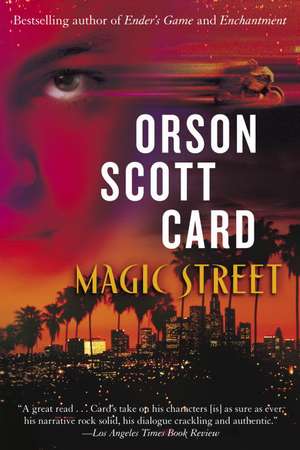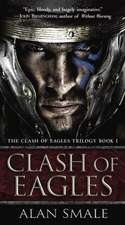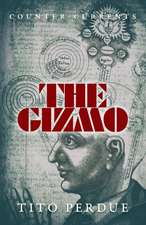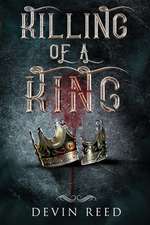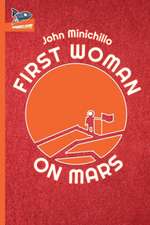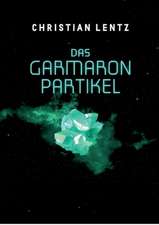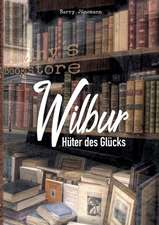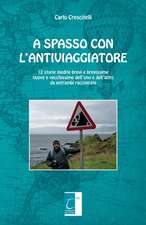Magic Street
Autor Orson Scott Carden Limba Engleză Paperback – 31 mai 2006 – vârsta de la 14 până la 18 ani
In a peaceful, prosperous African American neighborhood in Los Angeles, Mack Street is a mystery child who has somehow found a home. Discovered abandoned in an overgrown park, raised by a blunt-speaking single woman, Mack comes and goes from family to family–a boy who is at once surrounded by boisterous characters and deeply alone. But while Mack senses that he is different from most, and knows that he has strange powers, he cannot possibly understand how unusual he is until the day he sees, in a thin slice of space, a narrow house. Beyond it is a backyard–and an entryway into an extraordinary world stretching off into an exotic distance of geography, history, and magic.
Passing through the skinny house that no one else can see, Mack is plunged into a realm where time and reality are skewed, a place where what Mack does and sees seem to have strange affects in the “real world” of concrete, cars, commerce, and conflict. Growing into a tall, powerful young man, pursuing a forbidden relationship, and using Shakespeare’s Midsummer’s Night Dream as a guide into the vast, timeless fantasy world, Mack becomes a player in an epic drama. Understanding this drama is Mack’s challenge. His reward, if he can survive the trip, is discovering not only who he really is . . . but why he exists.
Both a novel of constantly surprising entertainment and a tale of breathtaking literary power, Magic Street is a masterwork from a supremely gifted, utterly original American writer–a novel that uses realism and fantasy to delight, challenge, and satisfy on the most profound levels.
From the Hardcover edition.
Preț: 116.06 lei
Nou
Puncte Express: 174
Preț estimativ în valută:
22.21€ • 23.10$ • 18.62£
22.21€ • 23.10$ • 18.62£
Carte disponibilă
Livrare economică 21 februarie-07 martie
Preluare comenzi: 021 569.72.76
Specificații
ISBN-13: 9780345416902
ISBN-10: 0345416902
Pagini: 397
Dimensiuni: 141 x 213 x 23 mm
Greutate: 0.33 kg
Editura: Del Rey Books
ISBN-10: 0345416902
Pagini: 397
Dimensiuni: 141 x 213 x 23 mm
Greutate: 0.33 kg
Editura: Del Rey Books
Notă biografică
Orson Scott Card burst on the scene in the early 1980s as a short-story writer, whose highly praised work appeared frequently in Omni and other magazines. He is the award-winning author of Enchantment, Ender’s Game, and the Alvin Maker series, among other novels. Card lives with his family in Greensboro, North Carolina.
From the Hardcover edition.
From the Hardcover edition.
Extras
Bag Man
The old man was walking along the side of the Pacific Coast Highway in Santa Monica, gripping a fistful of plastic grocery bags. His salt-and-pepper hair was filthy and hanging in that sagging parody of a Rastafarian hairdo that most homeless men seem to get, white or black. He wore a once-khaki jacket stained with oil and dirt and grass and faded with sunlight. His hands were covered with gardening gloves.
Dr. Byron Williams passed him in his vintage Town Car and then stopped at the light, waiting to turn left to go up the steep road from the PCH to Ocean Avenue. A motorcycle to the left of him gunned its engine. Byron looked at the cyclist, a woman dressed all in black leather, her face completely hidden inside a black plastic helmet. The blank faceplate turned toward him, regarded him for a long moment, then turned to the front again.
Byron shuddered, though he didn’t know why. He looked the other way, to the right, across the lanes of fast-moving cars that were speeding up to get on the 10 and head east into Los Angeles. Normally Byron would be among them, heading home to Baldwin Hills from his day of classes and meetings at Pepperdine.
But tonight he had promised Nadine that he’d bring home dinner from I Cugini. That’s the kind of thing you had to do when you married a black woman who thought she was Italian. Could have been worse. Could have married a black woman who thought she was a redneck. Then they’d have to vacation in Daytona every year and listen to country music and eat possum and potato-chip-and-mayonnaise sandwiches on white bread.
Or he could be married to a biker like the woman still revving her engine in the other left-turn lane. He could just imagine getting dragged into biker bars, where, as an African-American professor of literature specializing in the romantic poets, he would naturally fit right in. He tried to imagine himself taking on a half-dozen drunken bikers with chains and pipes. Of course, if he were with that biker woman, he wouldn’t have to fight them. She looked like she could take them on herself and win—a big, strong woman who wouldn’t put up with nonsense from any- body.
That was a lot to know about a woman without seeing her face, but her body, her posture, her choice of costume and bike, and above all that challenging roar from her bike—the message was clear. Don’t get in front of me, buddy, cause I’m coming through.
He only gradually realized that he was staring right at the homeless man with the handfuls of grocery bags. The man was stopped at the edge of the roadway, facing him, staring back at him. Now that Byron could see his face, he realized that the man wasn’t faking his rasta do—he was entitled to it, being a black man. A filthy, shabby, rheumy-eyed, chin-stubbled, grey-bearded, slack-lipped old bum of a black man. But the hair was authentic.
Authentic. Thinking of the word made Byron cringe. Every year there was at least one student in one of his classes who’d mutter something—or say it boldly—about how the very fact that he was teaching courses in nineteenth-century white men’s literature made him less authentic as a black man. Or that being a black man made him less authentic as a teacher of English literature. As if all a black man ought to aspire to teach was African studies or black history or Swahili.
The old man winked at him.
And suddenly Byron’s annoyance drained away and he felt a little giddy. What was he brooding about? Students gave crap to their teachers whenever they thought they could get away with it. They learned soon enough that in Byron’s classes, the students who cared would become the kind of people who were fit to understand Wordsworth, Shelley, Keats, Coleridge, Grey, and—of course—Lord Byron himself. That’s what his good students sometimes called him—Lord Byron. Not to his face, because he always gave them his withering glare until they apologized. But he reveled in the knowledge that they called him that behind his back. And if he ever let anyone see his poetry, perhaps they’d discover that it was a name he deserved.
Lines from one of his own poems came to his mind. And from his mind, straight to his lips:
Into my chariot, whispered the sun god. Here beside me, Love, crossing the sky. Leave the dusty road on which you plod: Behind these fiery horses come and fly. No matter how fast we go, how far, how high, I’ll never let you fall. All your life On earth you’ve crept and climbed and clawed— Now, Mortal Beauty, be my wife, And of your dreams of light, I’ll grant you all.
The bag man’s lips parted into a snaggle-toothed grin, and he stepped out into the traffic, heading straight for Byron’s car.
For a moment Byron was sure the man would be killed. But no. The light had changed, and the cars came to a stop as he passed in front of them. In only a few moments, he set his hand to the handle of Byron’s passenger door.
It was locked. Byron pushed the button to open it.
“Don’t mind if I do,” said the bag man. “Mind if I put my bags in your back seat?”
“Be my guest,” said Byron.
The old man opened the back door and carefully arranged his bags on the floor and back seat. Byron wondered what was in them. Whatever it was, it couldn’t be clean, and the bags probably had fleas or lice or ants or other annoying creatures all over them. Byron always kept this car spotless—the kids knew the rules, and never dared to eat anything inside this car, lest a crumb fall and they get a lecture from their dad. Sorry if that annoyed them, but it was good for children to learn to take care of nice things and treat them with respect.
And yet, even though he knew that letting those bags sit in the back seat would require him to vacuum and wash and shampoo until it was clean again, he didn’t mind. Those bags belonged there. As the old man belonged in the front seat beside him.
The motorcycle to his left revved one last time and whined off up the steep road to Santa Monica.
Behind him, cars started honking.
The old man took his time getting into the front seat, and then he just sat there, not closing his door. Nor had he closed the back door, either.
No matter. To a chorus of honks and a few curses shouted out of open car windows, Byron got out and walked around to the other side of the Lincoln. He closed the back door, then reached in and fastened the old man’s seat belt before he closed that door, too.
“Oh, you don’t need to do that,” murmured the old man as Byron fastened the belt.
“Safety first,” said Byron. “Nobody dies in my car.”
“No matter how fast we go, how far, how high,” answered the old man.
Byron grinned. It felt good, to have someone know his poem so well he could quote it back to hm.
By the time he got back to the driver’s door, the cars behind him were whipping out into the leftmost turn lane to get around him, honking and screaming and flipping him off as they passed. But they couldn’t spoil his good mood. They were jealous, that’s all, because the old man had chosen to ride in his car and not theirs.
Byron sat down, closed his door, fastened his seat belt, and prepared to wait for the next green light.
“Ain’t you gonna go?” asked the old man.
Byron looked up. Incredibly, the left arrow was still green.
“Why not,” he said. He pulled forward at a stately pace.
To his surprise, the light at the top of the hill was still green, and the next light, too.
“Hope you don’t mind,” said Byron. “Got to stop and pick up dinner.”
“A man’s got to keep his woman happy,” said the old man. “Nothing more important in life. Except teaching your kids to be right with God.”
That made Byron feel a little pang of guilt. Neither he nor Nadine were much for going to church. When his mother came to visit, they all went to church together, and the kids seemed to enjoy it. But they called it Grandma’s church, even though she only attended it when she came to LA.
Byron turned left on Broadway and pulled up in the valet parking lane in front of I Cugini. The valet headed toward his car as Byron got out.
“Just picking up some takeout,” he said as he handed the man a five-dollar bill.
“Pay after,” said the valet.
“No, don’t park the car, I’m just picking up a takeout order.”
The man looked at him in bafflement. Apparently he hadn’t been here long enough to understand English that wasn’t exactly what he expected to hear.
So Byron spoke to him in Spanish. “Hace el favor de no mover mi carro, si? Voltaré en dos minutos.”
The man grinned and sat down in the driver’s seat.
“No,” said Byron, “no mueva el auto, por favor!”
The old man leaned over. “Don’t worry, son,” he said. “He don’t want to move the car. He just wants to talk to me.”
Of course, thought Byron. This old man must be familiar to all the valets. When you spend hours a day at the curb in Santa Monica, you’re going to get to know all the homeless people.
Only when he was waiting at the counter for the girl to process his credit card did it occur to Byron that he spoke Italian and French, and could read Greek, but had never spoken or studied Spanish in his life.
Well, you learn a couple of romance languages, apparently you know them all.
The food was ready to go, and the card went right through on the first try. They didn’t even ask him for i.d.
And when he got back outside, there was his car at the curb, and the valet was inside, kissing the old man’s hands. By the time Byron got around to the driver’s side and opened the back door, the valet was out of the car. Byron put the takeout bags on the floor, stood up, and closed the back door. The valet was already walking away.
“Wait a minute!” called Byron. “Your tip!”
The valet turned and waved his hand. “No problem!” he called in heavily accented English. “Thank you very much sir!”
Byron got in and sat down. “Never heard of a valet turning down a tip,” he said.
From the Hardcover edition.
The old man was walking along the side of the Pacific Coast Highway in Santa Monica, gripping a fistful of plastic grocery bags. His salt-and-pepper hair was filthy and hanging in that sagging parody of a Rastafarian hairdo that most homeless men seem to get, white or black. He wore a once-khaki jacket stained with oil and dirt and grass and faded with sunlight. His hands were covered with gardening gloves.
Dr. Byron Williams passed him in his vintage Town Car and then stopped at the light, waiting to turn left to go up the steep road from the PCH to Ocean Avenue. A motorcycle to the left of him gunned its engine. Byron looked at the cyclist, a woman dressed all in black leather, her face completely hidden inside a black plastic helmet. The blank faceplate turned toward him, regarded him for a long moment, then turned to the front again.
Byron shuddered, though he didn’t know why. He looked the other way, to the right, across the lanes of fast-moving cars that were speeding up to get on the 10 and head east into Los Angeles. Normally Byron would be among them, heading home to Baldwin Hills from his day of classes and meetings at Pepperdine.
But tonight he had promised Nadine that he’d bring home dinner from I Cugini. That’s the kind of thing you had to do when you married a black woman who thought she was Italian. Could have been worse. Could have married a black woman who thought she was a redneck. Then they’d have to vacation in Daytona every year and listen to country music and eat possum and potato-chip-and-mayonnaise sandwiches on white bread.
Or he could be married to a biker like the woman still revving her engine in the other left-turn lane. He could just imagine getting dragged into biker bars, where, as an African-American professor of literature specializing in the romantic poets, he would naturally fit right in. He tried to imagine himself taking on a half-dozen drunken bikers with chains and pipes. Of course, if he were with that biker woman, he wouldn’t have to fight them. She looked like she could take them on herself and win—a big, strong woman who wouldn’t put up with nonsense from any- body.
That was a lot to know about a woman without seeing her face, but her body, her posture, her choice of costume and bike, and above all that challenging roar from her bike—the message was clear. Don’t get in front of me, buddy, cause I’m coming through.
He only gradually realized that he was staring right at the homeless man with the handfuls of grocery bags. The man was stopped at the edge of the roadway, facing him, staring back at him. Now that Byron could see his face, he realized that the man wasn’t faking his rasta do—he was entitled to it, being a black man. A filthy, shabby, rheumy-eyed, chin-stubbled, grey-bearded, slack-lipped old bum of a black man. But the hair was authentic.
Authentic. Thinking of the word made Byron cringe. Every year there was at least one student in one of his classes who’d mutter something—or say it boldly—about how the very fact that he was teaching courses in nineteenth-century white men’s literature made him less authentic as a black man. Or that being a black man made him less authentic as a teacher of English literature. As if all a black man ought to aspire to teach was African studies or black history or Swahili.
The old man winked at him.
And suddenly Byron’s annoyance drained away and he felt a little giddy. What was he brooding about? Students gave crap to their teachers whenever they thought they could get away with it. They learned soon enough that in Byron’s classes, the students who cared would become the kind of people who were fit to understand Wordsworth, Shelley, Keats, Coleridge, Grey, and—of course—Lord Byron himself. That’s what his good students sometimes called him—Lord Byron. Not to his face, because he always gave them his withering glare until they apologized. But he reveled in the knowledge that they called him that behind his back. And if he ever let anyone see his poetry, perhaps they’d discover that it was a name he deserved.
Lines from one of his own poems came to his mind. And from his mind, straight to his lips:
Into my chariot, whispered the sun god. Here beside me, Love, crossing the sky. Leave the dusty road on which you plod: Behind these fiery horses come and fly. No matter how fast we go, how far, how high, I’ll never let you fall. All your life On earth you’ve crept and climbed and clawed— Now, Mortal Beauty, be my wife, And of your dreams of light, I’ll grant you all.
The bag man’s lips parted into a snaggle-toothed grin, and he stepped out into the traffic, heading straight for Byron’s car.
For a moment Byron was sure the man would be killed. But no. The light had changed, and the cars came to a stop as he passed in front of them. In only a few moments, he set his hand to the handle of Byron’s passenger door.
It was locked. Byron pushed the button to open it.
“Don’t mind if I do,” said the bag man. “Mind if I put my bags in your back seat?”
“Be my guest,” said Byron.
The old man opened the back door and carefully arranged his bags on the floor and back seat. Byron wondered what was in them. Whatever it was, it couldn’t be clean, and the bags probably had fleas or lice or ants or other annoying creatures all over them. Byron always kept this car spotless—the kids knew the rules, and never dared to eat anything inside this car, lest a crumb fall and they get a lecture from their dad. Sorry if that annoyed them, but it was good for children to learn to take care of nice things and treat them with respect.
And yet, even though he knew that letting those bags sit in the back seat would require him to vacuum and wash and shampoo until it was clean again, he didn’t mind. Those bags belonged there. As the old man belonged in the front seat beside him.
The motorcycle to his left revved one last time and whined off up the steep road to Santa Monica.
Behind him, cars started honking.
The old man took his time getting into the front seat, and then he just sat there, not closing his door. Nor had he closed the back door, either.
No matter. To a chorus of honks and a few curses shouted out of open car windows, Byron got out and walked around to the other side of the Lincoln. He closed the back door, then reached in and fastened the old man’s seat belt before he closed that door, too.
“Oh, you don’t need to do that,” murmured the old man as Byron fastened the belt.
“Safety first,” said Byron. “Nobody dies in my car.”
“No matter how fast we go, how far, how high,” answered the old man.
Byron grinned. It felt good, to have someone know his poem so well he could quote it back to hm.
By the time he got back to the driver’s door, the cars behind him were whipping out into the leftmost turn lane to get around him, honking and screaming and flipping him off as they passed. But they couldn’t spoil his good mood. They were jealous, that’s all, because the old man had chosen to ride in his car and not theirs.
Byron sat down, closed his door, fastened his seat belt, and prepared to wait for the next green light.
“Ain’t you gonna go?” asked the old man.
Byron looked up. Incredibly, the left arrow was still green.
“Why not,” he said. He pulled forward at a stately pace.
To his surprise, the light at the top of the hill was still green, and the next light, too.
“Hope you don’t mind,” said Byron. “Got to stop and pick up dinner.”
“A man’s got to keep his woman happy,” said the old man. “Nothing more important in life. Except teaching your kids to be right with God.”
That made Byron feel a little pang of guilt. Neither he nor Nadine were much for going to church. When his mother came to visit, they all went to church together, and the kids seemed to enjoy it. But they called it Grandma’s church, even though she only attended it when she came to LA.
Byron turned left on Broadway and pulled up in the valet parking lane in front of I Cugini. The valet headed toward his car as Byron got out.
“Just picking up some takeout,” he said as he handed the man a five-dollar bill.
“Pay after,” said the valet.
“No, don’t park the car, I’m just picking up a takeout order.”
The man looked at him in bafflement. Apparently he hadn’t been here long enough to understand English that wasn’t exactly what he expected to hear.
So Byron spoke to him in Spanish. “Hace el favor de no mover mi carro, si? Voltaré en dos minutos.”
The man grinned and sat down in the driver’s seat.
“No,” said Byron, “no mueva el auto, por favor!”
The old man leaned over. “Don’t worry, son,” he said. “He don’t want to move the car. He just wants to talk to me.”
Of course, thought Byron. This old man must be familiar to all the valets. When you spend hours a day at the curb in Santa Monica, you’re going to get to know all the homeless people.
Only when he was waiting at the counter for the girl to process his credit card did it occur to Byron that he spoke Italian and French, and could read Greek, but had never spoken or studied Spanish in his life.
Well, you learn a couple of romance languages, apparently you know them all.
The food was ready to go, and the card went right through on the first try. They didn’t even ask him for i.d.
And when he got back outside, there was his car at the curb, and the valet was inside, kissing the old man’s hands. By the time Byron got around to the driver’s side and opened the back door, the valet was out of the car. Byron put the takeout bags on the floor, stood up, and closed the back door. The valet was already walking away.
“Wait a minute!” called Byron. “Your tip!”
The valet turned and waved his hand. “No problem!” he called in heavily accented English. “Thank you very much sir!”
Byron got in and sat down. “Never heard of a valet turning down a tip,” he said.
From the Hardcover edition.
Recenzii
Praise for Orson Scott Card’s Enchantment
“Card is a powerful storyteller.”
–Los Angeles Times
“[His] prose is a model of narrative clarity; the author never says more than is needed or arbitrarily withholds information, yet even a simple declarative sentence carries a delicious hint of further revelation.”
–The New York Times
“The best writer science fiction has to offer.”
–The Houston Post
“Card is skilled at pacing and good with an action scene, but he has raised to a fine art the creation of suspense by ethical dilemma, and in doing so has raised his work to a high plane.”
–Chicago Sun-Times
From the Hardcover edition.
“Card is a powerful storyteller.”
–Los Angeles Times
“[His] prose is a model of narrative clarity; the author never says more than is needed or arbitrarily withholds information, yet even a simple declarative sentence carries a delicious hint of further revelation.”
–The New York Times
“The best writer science fiction has to offer.”
–The Houston Post
“Card is skilled at pacing and good with an action scene, but he has raised to a fine art the creation of suspense by ethical dilemma, and in doing so has raised his work to a high plane.”
–Chicago Sun-Times
From the Hardcover edition.
Descriere
Mack Street was born too soon, abandoned by an unknown mother in a Los Angeles park. It was a miracle he survived, and a miracle he reached his teen years, but what his foster mother never realized was that when he stared off in space he was seeing other people's dreams.
